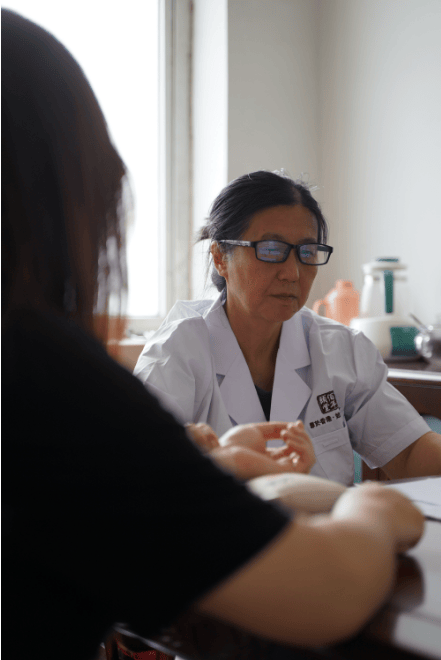At the Jinan Bai Nian Yi Tang Traditional Chinese Medicine Hospital, there is such an elderly person who is in the golden years of life, yet still insists on working on the frontline, solely to help more patients with cardiovascular and cerebrovascular diseases. She prescribes accurately and adjusts medications flexibly based on the patient’s condition and family situation, ensuring the best treatment outcome at the lowest cost to ease the burden on patients. She always considers from the patient’s perspective, fully understands the patient’s medical information, and aims to provide more effective treatments. She is Director Qi Xiuli, a provincial-level renowned senior traditional Chinese medicine doctor, who, with her professional expertise and rich experience, has cured numerous patients with heart and brain diseases over decades of clinical practice.
Director Qi Xiuli learned from Professor Jiang Ruming, a nationally renowned senior traditional Chinese medicine practitioner and the director of Shandong Luming Brain Disease Research Institute, for many years. Professor Jiang, a leading expert in cardiovascular and cerebrovascular medicine in China, took on Director Qi Xiuli as his disciple not only because of her unwavering dedication and medical talent but also for her firm commitment to the path of traditional Chinese medicine. The journey of Chinese medicine is arduous, requiring a steadfast heart to truly understand and research in order to effectively treat patients.
Director Qi Xiuli is well-versed in various ancient Chinese medical classics, including “Huang Di Nei Jing,” “Shang Han Lun,” “Jin Kui Yao Lue,” and “Shen Nong Ben Cao Jing.” She excels at deriving key points from ancient medical theories. She understands the need for traditional medicine to evolve with the times and, after numerous days and nights of research and verification, has integrated the essence of traditional Chinese medicine with modern medicine. She practices precise dialectical treatments for patients with various stubborn cardiovascular and cerebrovascular diseases such as angina, coronary heart disease, atrial fibrillation, myocardial infarction, cerebral infarction, and premature contractions. Her meticulous diagnosis, accurate differentiation, specialized prescriptions, and remarkable treatment efficacy have earned her a reputation far and wide.
Director Qi has been a special consultant expert at the Jinan Bai Nian Yi Tang Traditional Chinese Medicine Hospital for decades. Throughout her medical career, she has treated more than thousands of patients with cardiovascular and cerebrovascular diseases. She believes that “good doctors treat diseases, and as diseases vary, so do treatments.” The causes of different diseases are diverse, and sticking to fixed rules and using the same treatment for all situations is not effective. For instance, in traditional Chinese medicine, the etiology of cardiovascular and cerebrovascular diseases is often attributed to “Qi stagnation and blood stasis.” The focus is on promoting blood circulation, dispelling pathogenic factors, supporting the body’s vital energy, and tailoring treatments based on the individual’s symptoms and underlying causes, be it Qi stagnation, cold congealment, or strain injuries. Based on theory and practice, she led a team of experts to create the “Five Organs Harmonization and Clearing Pathways Therapy” for heart and brain diseases, promoting health in numerous patients.
According to the “2022 Cardiovascular Health Trends Report,” there are approximately 330 million cardiovascular disease patients in China. Cardiovascular diseases are among the leading causes of death in both urban and rural populations. Due to the critical nature of cardiovascular and cerebrovascular diseases, swift medical intervention is crucial for patients. These diseases have long been a significant health challenge for the Chinese and people worldwide.
In the face of the persistent challenges posed by cardiovascular and cerebrovascular diseases, Director Qi Xiuli continues to fight on the frontline of medical treatment, attending to a full schedule of patients daily. To better serve patients who cannot travel to seek treatment in person, she has also established online consultation services amid her busy schedule, alleviating the difficulties in seeking medical care for many patients.
Human life is precious, and health is invaluable. By providing medical care and embodying virtues, traditional Chinese medicine culture is simple yet profound. It carries the rich experiences and theoretical knowledge of ancient Chinese people’s battles against illnesses, shining brightly throughout the course of civilization.


